The UF/IFAS Department of Soil, Water, and Ecosystem Sciences (SWES) Experiential Learning Laboratory (ELL) offers hands-on, practical experiences for undergraduate students. The ELL hosted more than 100 university and high school students during the fall semester.
The focus of their field trips ranged from renewable energy sources and undergraduate research to composting and gardening. Regardless of what they came to see, the students’ host, Dr. Ann Wilkie, a professor in SWES, hoped for the same outcome: that they would all gain a deeper insight into the science and application of sustainable technologies. She wants students to apply the knowledge and skills they learn there to improve their community and the world.
“It is a core component of the ELL’s mission,” Wilkie said. “The power of experiential learning has a great impact on shaping the academic and personal journeys of students.”
The ELL bridges the gap between theoretical concepts and real-world applications through hands-on demonstration and activity areas. It also provides a place for students to work with SWES faculty through internships, fieldwork, and research projects. The experiential learning approach not only enhances understanding but also fosters critical thinking, problem-solving, and decision-making skills.
“Our lab’s focus on experiential learning is well-aligned with the American Association of Colleges and Universities’ high impact practices for undergraduate education,” Wilkie added.
Continued Outreach to Gainesville High School
One of the highlights of the fall was the visit to Gainesville High School (GHS). Dr. Wilkie spoke with students in Ms. Sadie Matteucci’s environmental science classes about the benefits of composting and gardening. This marked the second year of the ELL’s educational outreach to GHS.
As a follow-up to the classroom activity, students from GHS took a field trip to the ELL. They saw firsthand the workings of the Compost Cooperative and Gardens (CCG), which the ELL houses.
“When the students take what they learn about composting back to their school and homes, it’s a win-win,” Wilkie noted. “Not only are they gaining valuable knowledge, but they can share that knowledge with their friends and family members.”
The GHS students also learned about algal cultivation, its various uses, and bioenergy crops. All these topics represent different facets of the ELL.
“It’s one thing to read about science in a textbook, but it’s a true learning experience to see it up close, think about the processes involved, and ask questions,” Wilkie said.
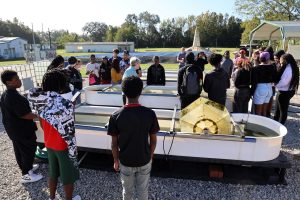
(Photo by SWES)
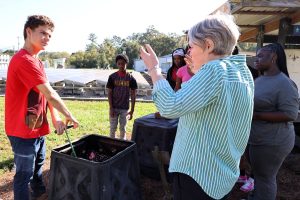
(Photo by SWES)
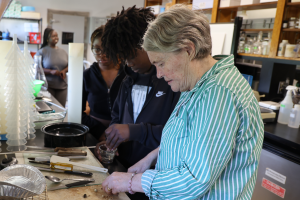
(Photo by SWES)
UF Undergraduate Classes
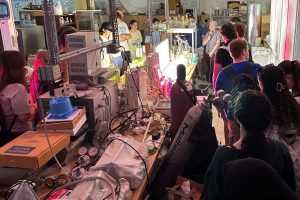
The ELL hosted Dr. Johanna Engström’s Future of Energy class, in October and November. Dr. Engström, assistant professor of geography, wanted her students to learn about the various energy research projects underway. Bioenergy crops and the working biodigester were the main areas of focus during the tour. Dr. Wilkie also discussed the solar energy array that provides electricity to the buildings in the research area. The excess electricity generated is fed back into the main power grid.
“When you consider the future of energy, you have to look at renewable sources. We feature those at the ELL and in our research,” Wilkie said. “I think the students now have a better understanding of what clean energy sources are and how incorporating them into the energy portfolio is achievable.”
UF Center for Undergraduate Research Tours
The ELL hosted one of the research facility tours organized by the UF Center for Undergraduate Research (CUR) during the CUR Research Week. The group of approximately 20 participating students from across UF learned about the interdisciplinary nature of the research conducted at the ELL. They also heard about opportunities to do their own mentored research under the supervision of Dr. Wilkie and other SWES faculty.
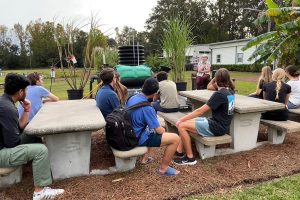
“Students can get involved in group and independent research, internships, and Extension/outreach through the ELL,” Wilkie explained. “The Compost Cooperative and Gardens also provides different leadership opportunities and research experiences.”
“Undergraduate research bridges curiosity and discovery—from the lab to the field and from abstract to applied concepts,” Olivia Tyler, CUR assistant director, said. “Dr. Wilkie showcased the numerous opportunities available to students at her lab. It became clear that students can immerse themselves in hands-on research that transforms ideas into action, specifically with sustainability issues.”
Dr. Wilkie has mentored dozens of undergraduate students conducting research. They present their research at departmental and university-wide research symposia. Some take their research to professional conferences. Others have published their findings in the UF Journal of Undergraduate Research. Past undergraduate research projects include:
-
- The growth and development of different types of algae
- Backyard biogas production
- Solar cooking for disaster relief
- Carbon capture and utilization
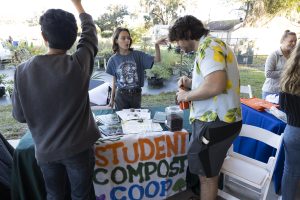
Tabling at the Fall Festival
The ELL also participated in the SWES table at the UF/IFAS Plant Sciences Fall Festival.
“It was an opportunity to connect with students, faculty, and staff from across the university,” said Dr. Wilkie. “It was a wonderful chance to share our work, inspire more students to get involved in experiential learning, and invite everyone to compost and garden at the CCG.”
The November 2024 event had more than 200 people attend.
Reflections from Students
Receiving feedback from students who participate in class visits helps the ELL improve future tours and events. Here are a few student highlights:
“I learned how compost is formed, that it is good for our environment, and how it helps grow their crops. I really had fun, and it was a great experience.” – GHS student
“This field trip was very eye-opening and engaging. It was interesting to see firsthand how the alternative energy sources we learn about in class are applied in the real world. I would have never had the opportunity to learn about this topic in such an in-depth way if it were not for this class.” – Future of Energy class student
“I went in thinking (the tour) would delve into some of the techier sustainable energy production and carbon capture procedures, but I have found that bioenergy is perhaps more compelling. I’m majoring in physics, and with this tour, I am now heavily considering biophysics!” – CUR tour participant
“Dr. Wilkie hosted an incredible research tour! She connected real-life applications to foundational topics… and highlighted the work of her past research students and encouraged us to get involved in her future projects, sharing countless ideas along the way. As a psychology major, I really appreciated how she made an effort to include a behavioral perspective on sustainability, making the tour both inclusive and insightful.” – CUR tour participant
“I found algal cultivation the most interesting and really enjoyed being able to go inside the lab. I was unaware of how beneficial algae could be and how it relates to renewable energy.” – Future of Energy class student
To find out more about the Experiential Learning Laboratory or schedule a tour, visit its website: https://soils.ifas.ufl.edu/experiential-learning-laboratory/
Featured image credit: SWES
 4
4
